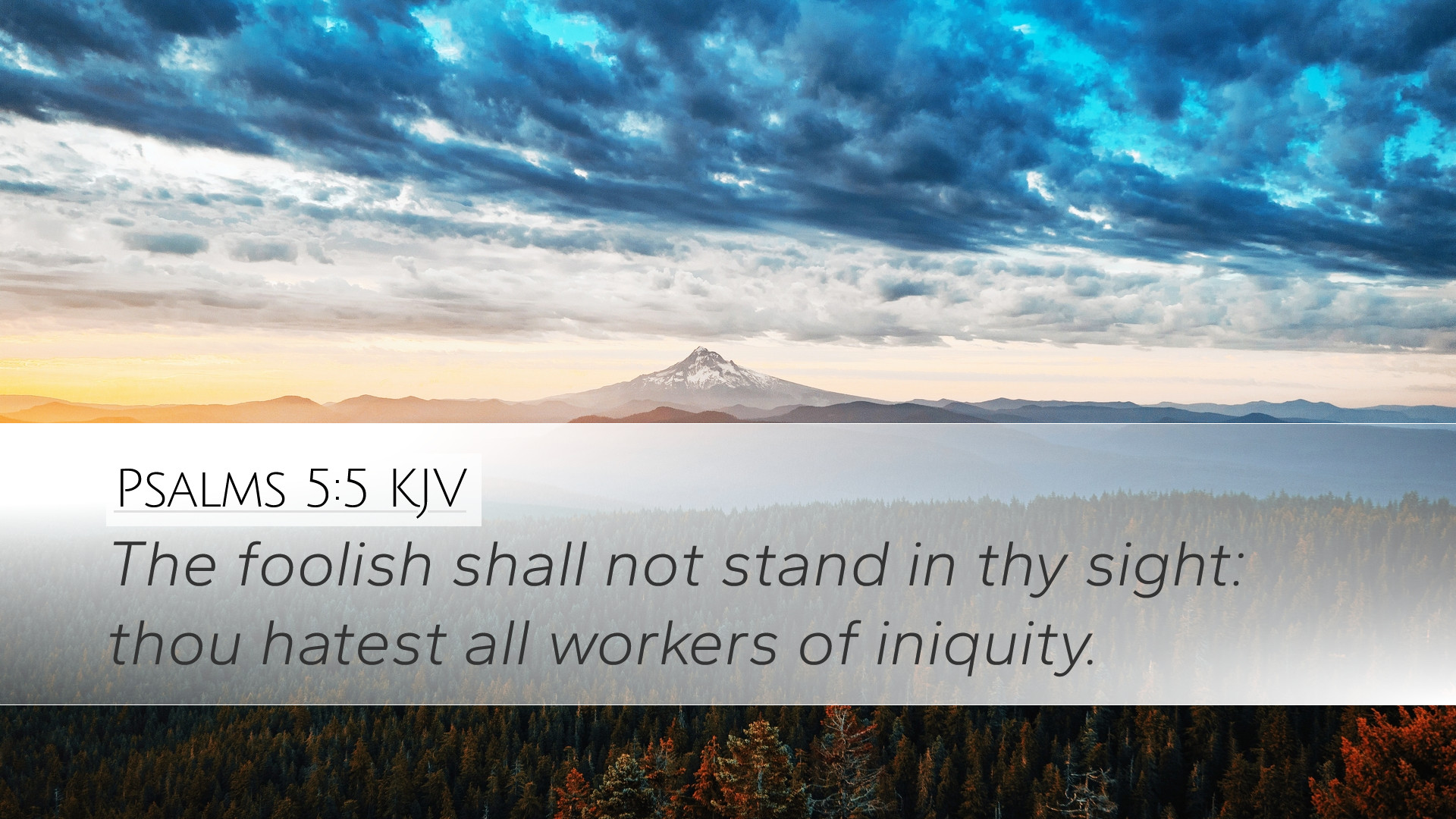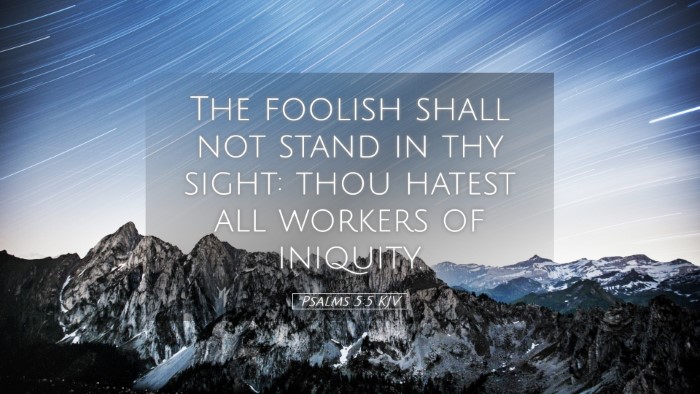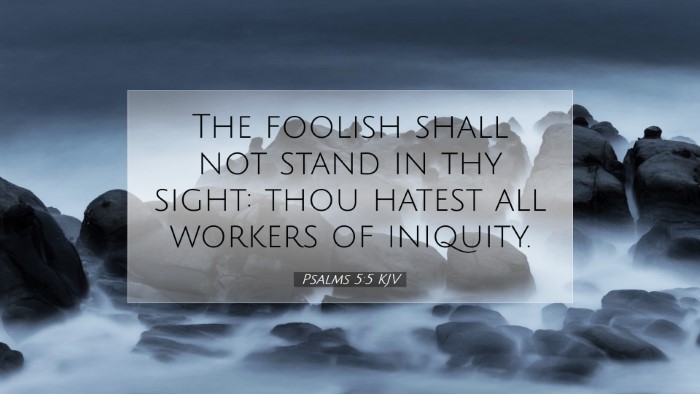Psalm 5:5 - Commentary Overview
Verse Text: "The foolish shall not stand in thy sight: thou hatest all workers of iniquity." (Psalm 5:5, KJV)
Introduction
This verse from the Psalms encapsulates a profound theological insight into God's nature and His relationship with humanity, particularly regarding sin and righteousness. The commentaries from Matthew Henry, Albert Barnes, and Adam Clarke offer in-depth reflections that provide valuable understanding for pastors, students, and scholars alike.
The Nature of God’s Hatred Towards Sin
Psalm 5:5 begins with a declaration of God's stance towards the foolish and the workers of iniquity. The term "foolish" here is understood not merely as lacking wisdom in a practical sense but in a moral and spiritual sense, indicating those who reject God's law.
Matthew Henry's Perspective
Matthew Henry emphasizes that folly is equated with rebellion against God. He notes, "Fools despise wisdom and instruction" (Proverbs 1:7), thus they cannot stand in His sight. Henry articulates that God's holiness necessitates His hatred of sin; it is not a capricious or arbitrary hatred but a natural consequence of His divine nature. Henry points out that this verse serves as a sobering reminder of God's righteous judgment against the ungodly.
Albert Barnes' Insights
Albert Barnes elaborates on the meaning of God "hating all workers of iniquity." He asserts that this hatred is not personal animosity but rather a rejection of sin itself. God's character is perfectly holy, and therefore, workers of iniquity cannot be in His presence. Barnes insists that understanding this aspect of God is critical for believers as it underlines the seriousness of sin and the necessity of repentance.
Adam Clarke's Commentary
Adam Clarke explores the implications of the word "stand," suggesting that it indicates not just physical posture but an inability to maintain a position before God. Clarke argues that the foolish—those who live without regard for divine instruction—will ultimately find themselves rejected by God. He posits that God's justice is a key theme in this verse, demonstrating that a life of iniquity leads to separation from God, who cannot tolerate sin.
Theological Implications
The notion that "the foolish shall not stand in thy sight" presents a dual aspect of God's nature: His love for righteousness and His abhorrence of sin. This theological dichotomy is vital for understanding sin’s consequences and the believer's need for redemption through Christ.
Righteousness and Divine Justice
In holistic biblical theology, righteousness is foundational. God’s disdain for "workers of iniquity" reflects His commitment to justice. As Henry suggests, "The Lord does not regard iniquity in any form." This echoes throughout Scripture, reassuring believers that all injustice will ultimately be rectified. Understanding God's unyielding stance against sin is paramount for developing a healthy fear of the Lord.
Call to Repentance
Each of the commentaries highlights the urgency of repentance. In confronting the reality of God’s judgment against sin, there is an implicit call for believers to examine their lives. Barnes emphasizes that while the verse paints a bleak picture for the unrepentant, there is hope in the call to righteousness and the grace offered to those who turn from their ways.
Practical Application
For pastors, the application of this verse involves teaching congregants the seriousness of sin and the importance of living in accordance with God's will. For students and theologians, the insights gleaned from these commentaries encourage profound study of God’s attributes and the consequential ethics that arise from His holiness.
Encouraging Holiness
Pastors are challenged to motivate their congregations toward holiness, emphasizing that a genuine relationship with God involves a rejection of sinful behavior. Clarke emphasizes that while God's hatred of sin is evident, His mercy is available to the penitent.
Reflection and Mindfulness
Students and scholars are urged to engage in reflective practice, understanding the implications of standing before a holy God. This involves a lifelong commitment to study, prayer, and community, fostering a deeper relationship with God that is characterized by wisdom and righteousness.
Conclusion
Psalms 5:5 serves as a powerful reminder of God's nature toward humanity, His justice, and His call to righteousness. By synthesizing the insights from public domain commentaries, we witness a multifaceted understanding of this verse that can guide both personal and communal aspects of faith.
Final Reflection
In a world where moral ambiguity often prevails, believers are called to hold steadfast to the truths conveyed through Psalm 5:5. The firm promise that the foolish shall not stand brings both warning and hope—warning for those who persist in sin and hope for those who seek refuge in the righteousness provided through faith in Jesus Christ.


